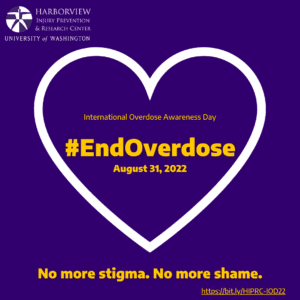
Tragically, more than one person dies each day from an opioid overdose in Washington State. These deaths can be prevented.
August 31 marks International Overdose Awareness Day (IOAD) each year. It’s a day to remember those we’ve lost to overdose, acknowledge the grief of the family and friends left behind, and renew our commitment to end overdose and related harms. Everyone can play a role. Talk to your doctor if you or someone close to you needs help for substance use.
Resources for Overdose Survivors and Family Members
Survivors of opioid overdose have experienced a life-changing and traumatic event. They have had to deal with the emotional consequences of overdosing, which can involve embarrassment, guilt, anger, and gratitude, all accompanied by the discomfort of opioid withdrawal. Most need the support of family and friends to take the next steps toward recovery.
While many factors can contribute to opioid overdose, it is almost always an accident. Moreover, the underlying problem that led to opioid use—most often pain or substance use disorder—still exists and continues to require attention.
The individual who has experienced an overdose is not the only one who has endured a traumatic event. Family members often feel judged or inadequate because they could not prevent the overdose. It is important for family members to work together to help the overdose survivor obtain the help that he or she needs. To find more resources on recovering from an opioid overdose, visit our Opioid Overdose Prevention Resource Guide or visit the Substance Abuse and Mental Health (SAMHSA) toolkit.
What is an overdose?
When there is too much opioid in the body, a person can lose consciousness and stop breathing – this is an overdose. An opioid overdose can happen suddenly or come on slowly over a few hours. Without oxygen, a person can die. Most opioid users (64-97%) report that they have witnessed at least one overdose. And often friends and family likely have concerns for opioid use. Recognizing and responding to the early signs of overdose can save the life of someone you love.
The risk of opioid overdose increases when a person is:
Recognizing an overdose can be difficult. If you aren’t sure, it is best to treat the situation like an overdose—you could save a life. Call 911 immediately. Administer naloxone, if it’s available. Do not leave the person alone. Signs of an overdose may include:
Naloxone can reverse an overdose from opioids, including heroin, illicitly manufactured fentanyl and fentanyl analogs, and prescription opioid medications. Often given as a nasal spray, naloxone is safe and easy to use.
This International Overdose Awareness Day, you can make an impact by sharing HIPRC’s opioid prevention work and resources with colleagues, partners, and loved ones. We invite you to join us in taking action to end overdose. Help us spread this message on social media as well by sharing any content by HIPRC or our partners.
Download & Share the HIPRC 2022 International Overdose Awareness Day graphic on social media using the hashtag #EndOverdose:
